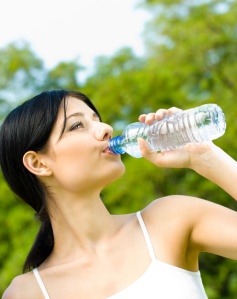New Year New You 2013
Stay Hydrated, Stay healthy
By Joan Enderle, American Heart Association
The human body is made up of about 10 to 12 gallons, so replenishing your body’s water supply is crucial for proper function and health.
Keeping the body hydrated helps the heart more easily pump blood through the blood vessels to the muscles. And, it helps the muscles remove waste so that they can work efficiently. If you are well hydrated, your heart does not have to work as hard and helps your body regulate temperature. Adequate hydration can help you feel more energetic and help your skin look better.
Dehydration can be a serious condition that can lead to problems ranging from swollen feet or a headache to life-threatening illnesses such as heat stroke.
Water is best
For most people, water is the best thing to drink to stay hydrated. There are no calories in water. Additional sources of water also include foods, such as fruits and vegetables which contain a high percentage of water.
Sports drinks with electrolytes may be useful for people doing high intensity, vigorous exercise in very hot weather, though they tend to be high in calories. It may be healthier to drink water while you are exercising, and then when you are done, eat a healthy snack like orange slices, a banana or a small handful of unsalted nuts.
Other beverages such as sugary drinks, soda, coffee drinks and juices contain water but also may have a large number of calories, contributing to weight gain.
 How much water do you need?
How much water do you need?
The amount of water a person needs depends on a number of factors: climatic conditions, clothing worn and exercise intensity and duration. A person who perspires heavily will need to drink more than someone who doesn’t. Certain medical conditions, such as diabetes or heart disease, may also mean you need to drink more to avoid over-taxing the heart or other organs. Some medications can act as diuretics, causing the body to lose more fluid.
Thirst isn’t the best indicator of hydration status. If you get thirsty, you may already be dehydrated. The easiest thing to do is pay attention to the color of your urine. Pale and clear means you’re well hydrated. If it’s dark, drink more fluids.
A safe bet is to drink at least eight cups of water each day to make sure you are properly hydrated. The Dietary Reference Intakes from the Institute of Medicine recommends a total daily beverage intake of 13 cups for men and 9 cups for women.
If you want to know exactly how much fluid you need during exercise, experts recommends weighting yourself before and after exercise, to see how much you’ve lost through perspiration. A rule of thumb is every pound of sweat you lose, that’s a pint of water you’ll need to replenish.
Not sweating during vigorous physical activity can be a red flag that you’re dehydrated to the point of developing heat exhaustion.
Getting enough fluids during the winter is just as important as when temperatures are high. When you’re exposed to extreme temperatures – whether it’s very hot or very cold – your body uses more water to maintain is normal temperature. Also, in the winter you’re exposed to heated air, which evaporates water from your skin.
